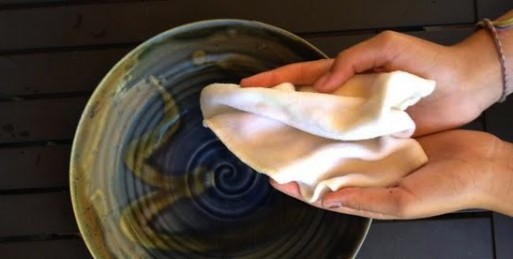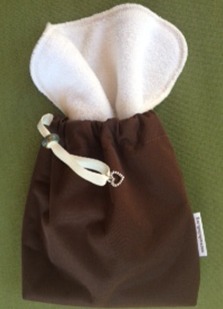Today SevenPonds speaks with Susan Oppie of One Washcloth. Susan has been in the medical field for over 19 years and has worked as everything from a Home Health Aide for the Visiting Nurse Association of Boston to working extensively in hospice. Together with a group of two other women, Susan launched One Washcloth, which creates beautiful, simple washcloths for the bereaved to wash and care for their dead with. Their gesture is simple, but the message, particularly in the words of Susan, is profound: “The majority of people in our society are not aware of their rights regarding caring for the dead. The mission of One Washcloth is to reintroduce this ancient art in a simple, nonthreatening way.”
MaryFrances: What is One Washcloth and how did it get started ?
Susan: Well, we don’t really know how we should define it yet. We have an idea. One Washcloth is definitely a project, but it’s more like a campaign. I would like to say it’s part of a movement that is helping reconnect people with death and the ritual of caring for the dead.
MaryFrances: How does one get involved in making washcloths for the dead? What were your (the founders’) backgrounds?
Susan: So the three co-founders, Rochelle Martin, Lynn Holzmann and myself, are all nurses. So we’ve come to this by being around a lot of death in our lives. Lynn and I have done a lot of hospice nursing. Rochelle is a psych nurse in an emergency room in Canada.
“I would like to say it’s part of a movement that is helping reconnect people with death and the ritual of caring for the dead.”
— Susan Oppie
MaryFrances: You’ve certainly experienced a lot of death firsthand.
Susan: We’ve all seen a whole lot of death, and we’ve all seen what a strange disconnect there is in our society from it. And we realized that that’s just so unfortunate and that our society could really benefit from reconnecting with a part of the circle of life. Without that connection, our society can’t thrive – death is also a huge part of existence and it’s the denial of it that really plays into the pathology of our society. Denial of anything, on any scale, creates problems for people.
MaryFrances: How did such a group of women meet?
Susan: The three of us met through the home funeral movement. We’ve all volunteered for some period of time within that movement, and I actually just stepped down as one of the board members of the National Home Funeral Alliance due to my move to Hawaii. But I knew I still felt very strongly and very passionately about the work I had been doing.
I feel that my contribution to everything end-of-life-related has come from my profession. Nurses are a very powerful force, especially when we unite. We can make a huge change if we’re focused and believe in a need for change.
“It could feel like too much, and I can understand that. So you really had to be drawn to it to take it up.”
— Susan Oppie
MaryFrances: Any thoughts on the home funeral movement?
Susan: I think the home funeral movement is fantastic; I’ve been involved in it for about nine years now. Other nurses used to get a deer-in-the-headlights kind of look when I told them about it, but they thought, “We’re already understaffed and overworked, how can we integrate this and learn all of the legalities…”. It could feel like too much, and I can understand that. So you really had to be drawn to it to take it up.
MaryFrances: Whose idea was it to bring in the washcloth idea? To really make it the center of everything?
Susan: The three of us got together to speak about what we as nurses could do in the movement. Rochelle actually shared her habit of handing loved ones a washcloth in the emergency room after a death. No matter how tragic or violent a death was, she would always offer a washcloth to the survivors. Every time that they accepted it, she saw a huge transformation take place – just through that simple gesture.
MaryFrances: What role can the washcloths of One Washcloth play in the grieving process?
Susan: Again, I’d have to go back to the simple use of it, wiping the hands or face of a loved one. It’s a very smooth entry into the grieving process, much smoother than stepping away from the body of a loved one and not touching it — creating that distance.
MaryFrances: Could you tell me more about the washcloths? How have they been received in the community?
Susan: Well it’s not a very hard sell for a nurse to hand someone a washcloth (laughs), and I think it is, again, almost instinctual. The instructions on the washcloths are very minimal. They say: “This cloth is a gift. Please use it to care for your loved one who has died as a final act of love. You may use it to gently wash your loved one’s face, hands and body as you would have in life. Follow your instincts, there is no “right way”, there is no rush. You may keep it as a reminder of the tender care you gave at the end,” and that’s pretty much it.
You’ll notice we don’t say, “scrub down XYZ…” because it’s really about empowering the individual. It makes them feel more involved in a sad situation. That involvement is a kind of power and strength to give to someone in that time, and it’s something that up until the recent “death movement” was disappearing in our culture in America.
“Follow your instincts, there is no “right way”, there is no rush.”
— Susan Oppie
MaryFrances: What are the most popular questions people are raising about the washcloths?
Susan: One concern that came up from a woman in England, who has expressed great support for us, was concern about spreading disease. It’s a very real concern. But you just follow the same precautions that you would if that person were alive. If that person was in an isolation room
MaryFrances: Any thoughts on the funeral industry today?
Susan: The history of caring for loved ones in this country brings us back to the importance of community and family in caring for someone who has died. Of course that changed with the rise of the funeral industry. It’s scary.
One thing I appreciate about home funeral pioneers is that we say we have to step through that doorway of fear. That moment when you walk into a room to see your loved one, dead, and let it become a natural thing. But you have to take that courageous step. It’s the same principle with the washcloth, a simple step and a basic gesture.
MaryFrances: Who do you think would benefit from One Washcloth’s product in particular?
Susan: Well we just launched our website in January, so we’re working on getting more and more feedback, but I would say that it’s beneficial for parents whose children have died. They can continue to spend time with them, to care for them.
MaryFrancs: Do you have any experiences with clients that impacted you that you would like to share?
Susan: I remember one group of adult women in particular. They took on the task of bathing their mother and caring for her. They shared their tears, stories and laughter and it was beautiful. They really grew from that experience.
Another story from Portland comes to mind, in which a young man had been killed. His friends — all of them young men — really stepped up to the plate to care for him. To see these young men take on a role that has, at least historically, been largely devoted to women was so moving.
“…a young man had been killed. His friends — all of them young men — really stepped up to the plate to care for him.”
— Susan Oppie
MaryFrances: Especially because “nurturing” isn’t always a word we see associated with men in the media.
Susan: Exactly. I could see in their faces that they needed to do this, and the washcloth became a valuable tool for them to connect with that side of themselves.
MaryFrances: What’s next for One Washcloth?
Susan: We really want to get into hospitals where death is such a constant. Staff and people coming into the hospital need to have some sort of way to express tenderness and emotion and I think our washcloths can help.
I mean, obviously we don’t “own” washcloths all over the world (laughs). We merely want to show that it’s an easy thing people can do for themselves. We want them to pick up that cloth, and let go of some degree of fear they have with death.
MaryFrances: Thank you, Susan.
Susan: Thank you!

 How Can You Care for a Loved One Immediately after Death? An Interview with Susan Oppie
How Can You Care for a Loved One Immediately after Death? An Interview with Susan Oppie






 Funeral Favors Offer Visitors a Tangible Memento
Funeral Favors Offer Visitors a Tangible Memento
 “Comeback” by Prince
“Comeback” by Prince
 “Other Side” Documents Woman’s Fight To Die As She Wishes
“Other Side” Documents Woman’s Fight To Die As She Wishes














